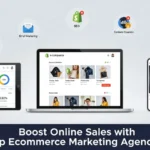
How to Implement AI in Your Digital Marketing Strategy
Introduction: Embracing the AI Revolution in Digital Marketing
AI (Artificial Intelligence) is rapidly transforming the landscape of digital marketing. Its ability to analyze vast amounts of data, automate tasks, and personalize customer experiences is revolutionizing how businesses connect with their audiences. Implementing AI can lead to significant improvements in efficiency, enhanced personalization, and a higher return on investment (ROI). This guide provides a step-by-step approach to help you integrate AI into your digital marketing strategy.
Step-by-step Instructions: Integrating AI into Your Digital Marketing
Step 1: Assessing Your Current Digital Marketing Landscape
Before diving into AI, it’s essential to evaluate your existing marketing strategy. Identify areas that can benefit from AI integration. Analyze your current digital marketing tools, data sources, and infrastructure. What are your current marketing goals and objectives? This assessment will help you pinpoint where AI can make the most impact.
Step 2: Identifying AI Tools and Technologies
Research and explore various AI-powered tools relevant to digital marketing. Consider tools for SEO, content creation, social media management, and email marketing. Explore options like chatbots, analytics platforms, and automation software. Evaluate the features, pricing, and compatibility of different tools. Consider exploring tools that can help generate blog ideas, create outlines, and write blogs or marketing emails. HubSpot’s AI-powered Content Assistant is a great example.

Step 3: Data Collection and Preparation
High-quality data is the backbone of effective AI implementation. This involves data cleansing, organization, and integration from various sources. Collect data from your website analytics, CRM, social media platforms, and other relevant sources. Ensure your data is accurate, complete, and well-organized. For more information on this, check out our guide on How to Transform Your Digital Marketing Strategy with AI.

Step 4: Selecting and Implementing AI Tools
Choose AI tools that align with your specific marketing objectives. For example, if you want to improve your Google Ads campaigns, consider tools that enhance ad copy generation or landing page optimization. Our guide on How to Use AI to Supercharge Your Google Ads Campaigns can help with this. Follow the tool’s setup instructions and integrate them with your existing marketing platforms.

Step 5: Training and Testing AI Models
Many AI tools require training with relevant data. The process involves feeding the tool with your prepared data to teach it how to perform specific tasks. After training, rigorously test and validate the AI models to ensure accuracy and effectiveness. Continuously monitor and refine the models based on performance data.
Step 6: Monitoring, Analyzing, and Optimizing
Establish key performance indicators (KPIs) to measure the impact of AI implementation. Track metrics such as conversion rates, website traffic, and customer engagement. Analyze the data to identify areas for optimization. Iterate on your strategies based on performance data and feedback. Use AI tools like Google Ads to track ad performance and calculate the ROI of digital marketing campaigns, as highlighted in How to Create an AI Digital Marketing Strategy.

Tips and Warnings: Maximizing AI Success
Data Privacy and Security Considerations
Adhere to all data privacy regulations, such as GDPR and CCPA. Implement robust security measures to protect your data and prevent potential breaches. Prioritizing data privacy is crucial for building trust with your audience.
Budget Allocation and Resource Planning
Budget wisely for AI tools, training, and implementation. Plan for the resources needed, including staffing and expertise. Consider the long-term costs and benefits of your AI investments.
Ethical Considerations in AI Marketing
Address ethical considerations related to AI, such as transparency, fairness, and bias. Encourage responsible AI implementation practices. Ensure your AI initiatives are aligned with ethical marketing principles.
The Importance of Human Oversight
While AI can automate many tasks, human oversight is essential. Balance automation with human creativity and judgment. Ensure that humans are involved in the decision-making process and can intervene when necessary. For more insights, see our article How to Enhance Your Marketing Campaigns with AI: A Step-by-Step Guide.
Conclusion: The Future of AI in Digital Marketing
Implementing AI in your digital marketing strategy can bring significant benefits. Remember the key steps: assess your current landscape, select the right tools, prepare your data, and continuously monitor and optimize your strategies. Embrace AI and stay informed about emerging trends to ensure your marketing efforts remain effective and competitive. AI offers significant advantages in digital marketing, including improved efficiency, personalization, and ROI.
Quick Summary
AI offers significant advantages in digital marketing, including improved efficiency, personalization, and ROI. Implementing AI involves assessing your current landscape, selecting the right tools, preparing your data, and continuously monitoring and optimizing your strategies. Prioritize data privacy, budget wisely, and always include human oversight. Explore how to use AI to optimize your Google Ads campaigns, covering Smart Bidding, keyword research, ad copy generation, landing page optimization, audience targeting, and performance analysis with this guide: How to Use AI to Supercharge Your Google Ads Campaigns.
FAQ
How do I get started with AI in digital marketing?
Begin by assessing your current marketing efforts, identifying areas for improvement, and researching AI tools.
What are the biggest challenges of implementing AI?
Data quality, budget constraints, and the need for skilled professionals are common challenges.
How can I measure the success of AI implementation?
Track key performance indicators (KPIs) such as conversion rates, website traffic, and customer engagement.
What are the ethical considerations of AI in marketing?
Focus on data privacy, transparency, and fairness to avoid bias and ensure responsible AI practices. For instance, in our article How to Use AI to Enhance Your Marketing Campaigns, we emphasize these points.
Do I need to be a technical expert to use AI marketing tools?
While some technical knowledge is helpful, many AI tools are designed to be user-friendly and accessible to marketers with varying levels of expertise.
Additional Resources / References
- How to Create an AI Digital Marketing Strategy
- 8 ways to use AI in digital marketing [+ examples] – HubSpot Blog
- How do you integrate AI into your marketing strategy? – Reddit
- How to Design an AI Marketing Strategy – Harvard Business Review
- AI in Digital Marketing – The Ultimate Guide
- Facebook Ads Mastery: A Step-by-Step Guide to High-Converting Campaigns
- How to Transform Your Digital Marketing Strategy with AI
- How to Use AI to Enhance Your Marketing Campaigns
- How to Use AI to Supercharge Your Google Ads Campaigns
- How to Enhance Your Marketing Campaigns with AI: A Step-by-Step Guide



